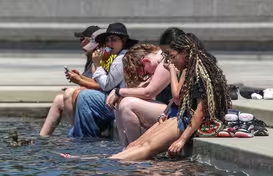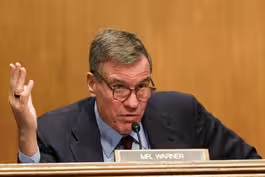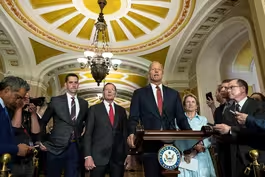
Trump's attempt to claw back funding, explained
Clip: 6/24/2025 | 7m 23sVideo has Closed Captions
Trump's attempt to claw back funding approved by Congress, explained
The House has approved President Trump’s request to claw back billions of dollars already appropriated for things like foreign aid and public media. That request now goes to the Senate, which will hold a hearing on it Wednesday. Laura Barrón-López explains the process and some of the arguments around it.
Problems playing video? | Closed Captioning Feedback
Problems playing video? | Closed Captioning Feedback
Major corporate funding for the PBS News Hour is provided by BDO, BNSF, Consumer Cellular, American Cruise Lines, and Raymond James. Funding for the PBS NewsHour Weekend is provided by...

Trump's attempt to claw back funding, explained
Clip: 6/24/2025 | 7m 23sVideo has Closed Captions
The House has approved President Trump’s request to claw back billions of dollars already appropriated for things like foreign aid and public media. That request now goes to the Senate, which will hold a hearing on it Wednesday. Laura Barrón-López explains the process and some of the arguments around it.
Problems playing video? | Closed Captioning Feedback
How to Watch PBS News Hour
PBS News Hour is available to stream on pbs.org and the free PBS App, available on iPhone, Apple TV, Android TV, Android smartphones, Amazon Fire TV, Amazon Fire Tablet, Roku, Samsung Smart TV, and Vizio.
Providing Support for PBS.org
Learn Moreabout PBS online sponsorshipGEOFF BENNETT: The House has approved President Trump's request to claw back billions of dollars in funds already appropriated by Congress for things like foreign aid and public media, including money that supports this program.
That request now goes to the Senate, which will hold a hearing on it tomorrow.
We want to take this moment to explain this process and some of the arguments around it.
Here's Laura Barron-Lopez.
DONALD TRUMP, President of the United States: So help me God.
JOHN ROBERTS, Chief Justice of the U.S. Supreme Court: Congratulations.
LAURA BARRON-LOPEZ: Almost immediately after taking office for the second time, President Trump moved to slash government spending.
He halted almost all foreign aid, paused federal grants and loans, and pulled money for everything from scientific research to libraries.
A flurry of lawsuits followed, and many of the cuts are now paused.
But the moves have brought renewed attention to a critical question about the separation of powers in the U.S. Can a president just refuse to spend money that has been appropriated by Congress?
RACHEL SNYDERMAN, Bipartisan Policy Center: The Constitution clearly outlines that the power of the purse resides with Congress.
The executive branch is then tasked with the execution of those funds.
So it is legally mandated that executive branch agencies follow the laws as written by Congress to spend appropriated funds as intended.
LAURA BARRON-LOPEZ: But what happens when an administration doesn't like the way Congress has told it to spend money?
For a long time, this wasn't an issue.
There is a commonly cited example that dates back to the 1800s.
DAVID SUPER, Georgetown University Law Center: There was a lot of money appropriated for war with France that didn't end up needing to be spent.
And so President Jefferson didn't spend it, with the consent and understanding of Congress.
Through much of this country's history, this was worked out in more informal ways.
LAURA BARRON-LOPEZ: That all changed with President Nixon.
In the early 1970s, amid the Watergate scandal, he decided not to spend billions of dollars for all sorts of programs he didn't like, what's known as impoundment.
RICHARD NIXON, Former President of the United States: I will not spend money if the Congress overspends.
The constitutional right for the president of the United States to impound funds, that right is absolutely clear.
LAURA BARRON-LOPEZ: But the courts disagreed.
In lawsuit after lawsuit, judges found Nixon overstepped his authority.
In one case, Nixon cut money appropriated to cities for sewage treatment.
The case made its way to the Supreme Court, which ruled unanimously that Nixon couldn't withhold the funding.
Largely in response to Nixon's actions, Congress, controlled by Democrats at the time, passed a law that laid out a process by which a president could withhold funds, the Impoundment Control Act of 1974.
DAVID SUPER: The idea was that the impoundments were not just unlawful, but also highly disruptive, that no one can count on the federal government's commitments of funding.
And so both Democrats and Republicans wanted a more predictable procedure for doing that.
LAURA BARRON-LOPEZ: The act set up two ways for presidents to legally impound funds.
One is a deferral, which allows the White House to temporarily delay spending.
The other is a rescission, which is permanent.
That process starts with the White House sending a message to Congress laying out the package of money it wants to claw back.
RACHEL SNYDERMAN: Congress would then have 45 days to consider that package.
Now, at the end of that 45 days, if Congress did not affirmatively approve that package or components of it on a simple majority basis, that funding would have to go into effect.
Now, importantly, kind of during this 45-day window, the process allows the executive branch to temporarily withhold funding.
LAURA BARRON-LOPEZ: After Nixon, every president from Ford to Clinton submitted rescission requests, nearly 1,200 of them in total, for things from energy programs to weapon systems.
Altogether, they accounted for about $77 billion, and Congress approved roughly a third.
Presidents George W. Bush, Obama and Biden didn't use rescissions at all.
In 2018, President Trump asked to claw back more than $14 billion for foreign assistance, agriculture, energy and health programs.
But it failed in the Senate.
Since then, Trump and his allies have made their thoughts on impoundment clear.
DONALD TRUMP: I will do everything I can to challenge the Impoundment Control Act in court, and, if necessary, get Congress to overturn it.
I will then use the president's long-recognized impoundment power to squeeze the bloated federal bureaucracy for massive savings.
LAURA BARRON-LOPEZ: The issue came up in a confirmation hearing for the director of the White House Office of Management and Budget.
SEN. GARY PETERS (D-MI): Do you believe the Impoundment Control Act of 1974 is the law of the land that you must follow?
RUSSELL VOUGHT, Director, Office of Management and Budget: It is the law of the land.
As you know, the president has run on that issue.
He believes it's unconstitutional.
For 200 years, presidents had the ability to spend less than an appropriation if they could do it for less.
JOHN YOO, Former Deputy Assistant Attorney General: Often when Congress says, spend money, it might say give out grants for medical research and don't give away more than or give up to $100 billion.
The president has some argument that he could say, I'm only going to spend 50 percent.
The law gives him the discretion to do that.
LAURA BARRON-LOPEZ: Some have also argued presidents can impound funds when they think an appropriation is unconstitutional or jeopardizes national security.
A tracker kept by Democrats has identified more than $425 billion in congressionally appropriated funds that Trump has blocked in his second term.
As of April, the Government Accountability Office, an independent agency in the legislative branch, had opened almost 40 investigations of those moves.
In 2020, the office found Trump violated the law when he withheld aid to Ukraine, an incident that became central to his first impeachment.
And last month, the GAO announced Trump violated the law when he refused to spend funds appropriated for electric vehicle charging stations.
JOHN YOO: In the past when presidents didn't want this bridge and water project or this kind of weapon system, they would go back to Congress and fight it out in a kind of legislative trench warfare.
And what the Impoundment Control Act tried to do was try to create a very pro-Congress system.
LAURA BARRON-LOPEZ: Despite President Trump's feelings about the Impoundment Control Act, his rescission requests this month cited the law.
It includes over $9 billion in cuts to foreign aid, the State Department and public media.
The 45-day congressional approval window will be up in July.
But if the request isn't approved, some experts say there will be even more questions about the legality of Trump's cuts so far, questions that may only be resolved when one of the current challenges reaches the Supreme Court.
DAVID SUPER: If they were able to persuade the Supreme Court that they do have an unlimited ability to withhold money, then the president will have enormous ability to threaten members of Congress with the loss of funding for projects in their district if they don't do what he says.
This would concentrate an enormous amount of power in the president.
LAURA BARRON-LOPEZ: For the "PBS News Hour," I'm Laura Barron-Lopez.
How proposed cuts to Medicaid could affect rural hospitals
Video has Closed Captions
Clip: 6/24/2025 | 4m 3s | How proposed cuts to Medicaid could affect rural hospitals (4m 3s)
Israel-Iran ceasefire holds as Trump lashes out at both
Video has Closed Captions
Clip: 6/24/2025 | 9m 39s | Fragile Israel-Iran ceasefire holds as Trump lashes out at both sides (9m 39s)
News Wrap: 160 million enduring brutal U.S. heatwave
Video has Closed Captions
Clip: 6/24/2025 | 4m 49s | News Wrap: 160 million enduring brutal conditions in U.S. heatwave (4m 49s)
Sen. Warner questions delay of Iran strike briefing
Video has Closed Captions
Clip: 6/24/2025 | 7m 17s | Sen. Warner questions administration's delay of Iran strike briefing (7m 17s)
Time running out for GOP to pass tax plan by Trump deadline
Video has Closed Captions
Clip: 6/24/2025 | 4m 38s | Time running out for GOP to pass massive tax and spending plan by Trump's deadline (4m 38s)
What's next for Iran's regime? Analysts weigh in
Video has Closed Captions
Clip: 6/24/2025 | 7m 30s | What's next for Iran's regime after U.S. strikes and Israel ceasefire? Analysts weigh in (7m 30s)
White House set to roll back national forest protections
Video has Closed Captions
Clip: 6/24/2025 | 6m 54s | White House set to roll back protections for nearly 60 million acres of national forests (6m 54s)
Providing Support for PBS.org
Learn Moreabout PBS online sponsorshipSupport for PBS provided by:
Major corporate funding for the PBS News Hour is provided by BDO, BNSF, Consumer Cellular, American Cruise Lines, and Raymond James. Funding for the PBS NewsHour Weekend is provided by...


















